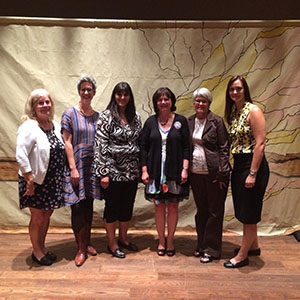‘Cracked’ shines a new light on dementia

Photo Credit: Research Manager Amanda Bradford-Janke
(From left to right, Mary Burnett, CEO, Alzheimer Society of Halton Hamilton, Julia Gray, Playwright/Director, JoAnne Chalifour, Regional Director of Operations, Alzheimer Society of Halton Hamilton, Sherry Dupuis, Co-Principal Investigator, Research Team, Gail Mitchell, Research Team, Amanda Bradford-Janke, Research Manager, Gilbrea Centre for Studies in Aging, McMaster University)
STORY BY JAKE HRIBLJAN
University researchers from York, U of T and Waterloo have collaborated with artists to create an innovative play that puts audiences directly into the experience of dementia.
Cracked: New Light on Dementia was put together by researchers Sherry Dupuis, Christine Jonas-Simpson, Pia Kontos, Gail Mitchell, and director/playwright Julia Gray. The performance is touring southern Ontario with shows in Hamilton, Ottawa and Toronto.
The story, which follows the life of an older woman diagnosed with dementia, was inspired largely by actual studies of dementia conducted by the researchers. The results were then blended with creative material written by Gray, in collaboration with the actors.
“We had transcripts from focus groups of people with dementia and their family members and we were asking them what they felt made life worth living,” says Gray.
That material was then taken and used as a starting point for what would be the story. “So we improvised a whole ton of material, some of it was terrible; some of it was brilliant, of course. All the health researchers improvised with us,” she continues.
This unique approach helped create a groundbreaking new play which hopes to inform, challenge and inspire audiences to think about this particular neurological illness from a different perspective.
“Well, there’s something about theatre, and seeing emotions played out that can connect in a different way than say, listening to a lecture,” said actor Lori Nancy Kalamanski. “Even just the music in the piece, people have commented that it can elicit strong emotion. It’s multi-layered.”
Alzheimer’s disease, or dementia, is a growing health problem in Canada. According to the Alzheimer Society of Canada, 747,000 Canadians had Alzheimer’s or other forms of dementia in 2011. The number will increase to 1.4 million by 2031 if nothing changes, the society says.
To make matters worse, Canada lacks a national strategy to tackle dementia.
“We’re the only G7 country that doesn’t have a national strategy. So call your MPs,” urged Dupuis following the show.
Cracked hopes to trigger a true national discussion on this aspect of mental health. The 45-minute play injects audiences directly into a mind altered by dementia. They get a glimpse at the fluid, non-linear and at times disorienting mindset those with dementia live in.
“Their reality is very fluid. It’s a shifting process of all at once being a mother, an older person, a child,” said Mitchell. “It’s not a returning to childhood, it’s like living everything you’ve ever been in a moment that’s very fluid. And dynamic.”
This type of mindset can be particularly difficult when forgetting the death of a loved one. “I’ve had people say, ‘Where’s my husband?’ and somebody else will say, ‘He’s dead’ and then they live the death over again,” said Mitchell. “But if you can move [the conversation] on to something like, ‘What would you say if John was here right now?’ or ‘What would you like John to know?’ then it’s a way of connecting with them and honouring their experience without turning away from it.”
Honouring the experiences of those with dementia is a fundamental key to helping them cope with everyday reality. Their past experiences aren’t to be ignored or pushed under the rug. Actor Dov Mickelson described his experience when being with his uncle who suffered from dementia.
“I learned early on how engaged and present you have to be with him. I’ll tell him the same story 50 times, and you don’t get upset with it, you just stay present, and go with the punches that he’s going with,” said Mickelson.
Cracked doesn’t just tackle the serious problems of living with dementia, but also, comically, roasts the absurdities of health care institutions and their at times, cold mechanistic approach to human suffering. This is particularly highlighted when the health care provider in the play is restricted from getting red balloons for a resident’s birthday.
“I think the important thing is coming up with solutions collaboratively in a home,” said Dupuis. “We’ve had many administrators at our performances…and say, ‘Oh my God, we have that policy in our home. I’m going back and we’re going to look at that.’ Our hope is to do a whole play on the absurdities of practice and policy because there are so many and we couldn’t fit them all in this play.”
Based on the lively Q&A after the show, Cracked clearly resonated with those in attendance. Many laughed, cried and asked for advice about how best to assist their loved ones.
For more information, check out Cracked: A New Light on Dementia on Facebook, Twitter and the University of Waterloo website.
Check out the Cracked: A New Light website here for info and show times
Below is a Thinglink showing which areas of the brain are affected by Alzheimer’s disease





